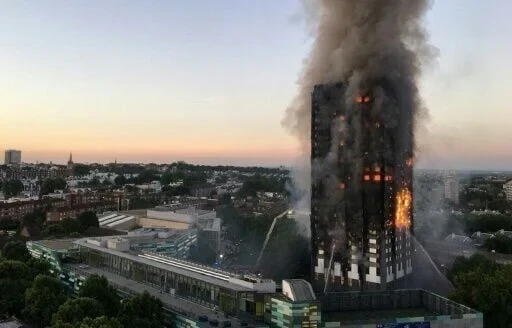The inquiry into the Grenfell Tower disaster that killed 72 people in Britain's worst residential fire since World War II will on Wednesday publish its long-awaited final report.
The fire in the early hours of June 14, 2017 spread rapidly through the 24-storey block in west London due to highly combustible cladding fixed to the exterior.
Started in a faulty freezer on the fourth floor, the blaze took barely half an hour to climb to the building's top floor with tragic consequences.
The final phase of the inquiry, led by retired judge Martin Moore-Bick, has now examined how Grenfell Tower came to be in a condition where a small fire could spread so catastrophically.
- Families perished -
The men, women and children who died included some whole family groups who found themselves trapped in their homes.
Abdulaziz El-Wahabi, 52, and his wife Faouzia, 41, died with their three children, the youngest of whom, Mehdi, was eight years old.
Mehdi's teacher recalled his ability to "make us laugh and smile" and "lighten our mood".
Abdulaziz was described as a "loyal family man" who would always "help neighbours with their bags and open doors".
Faouzia was "lively and friendly".
The tragedy's youngest victims were a still-born child and a six-month-old baby, Leena Belkadi, found with her mother in a stairwell between the 19th and 20th floors.
Residents who phoned the emergency services were told to remain in their flats and await rescue for nearly two hours after the fire broke out.
The "stay-put" advice, now considered to have cost lives, has since been revised.
- Dangerous buildings -
The inquiry's first report, published in October 2019, concluded that cladding that did not comply with building regulations was the "principal reason" for the rapid spread of the Grenfell blaze.
The second phase of the inquiry, started in January 2022, has concentrated on the many technical issues such as the effectiveness of safety testing for building materials.
In total the two phases of the inquiry have held more than 300 hearings and examined more than 1,600 witness statements.
The disaster has left many people living in buildings covered in similar cladding permanently fearful of a repeat tragedy.
Those who owned their own homes also faced financial problems as their apartments became unsaleable.
The UK's then Conservative government announced in 2022 that developers would be required to contribute more to the cost of the removal, with those in buildings over 11 metres high not having to pay at all.
But a fire in Dagenham, east London, just over a week ago illustrated the ongoing risks.
Over 80 people had to be evacuated in the middle of the night after waking to smoke and flames in a block where work to remove "non-compliant" cladding was part-completed.
London fire commissioner Andy Roe said there were still around 1,300 buildings in London alone where urgent "remediation" work still needed to be done.
Grenfell United, which represents many of the bereaved families and survivors, has called for guarantees that the inquiry's recommendations will be implemented in full.
It says that if recommendations made after an inquiry into a 2009 fire at another London residential block had been implemented the outcome of the Grenfell fire "could have been very different".
It is also calling for a new independent body to collate the findings of all public inquiries and ensure changes are made.
- Criminal charges? -
Bereaved relatives and survivors have said they are hopeful the inquiry will bring them what they say is the "truth we deserve".
For some that means jail for those who "made decisions putting profit above people's safety".
"For me there's no justice without people going behind bars," said Sandra Ruiz, whose 12-year-old niece Jessica Urbano Ramirez died.
London's Metropolitan Police has said its investigators will need until the end of 2025 to finalise its own investigation.
Prosecutors will then need a year to decide whether anyone will face charges.
For former Grenfell Tower resident Edward Daffarn, however, a delay that long is unacceptable.
"We are not prepared to wait for much longer, and this report needs to be the catalyst for significant movement forward from the Met Police in bringing charges against people who perpetrated the deaths of 72 people," he said.


